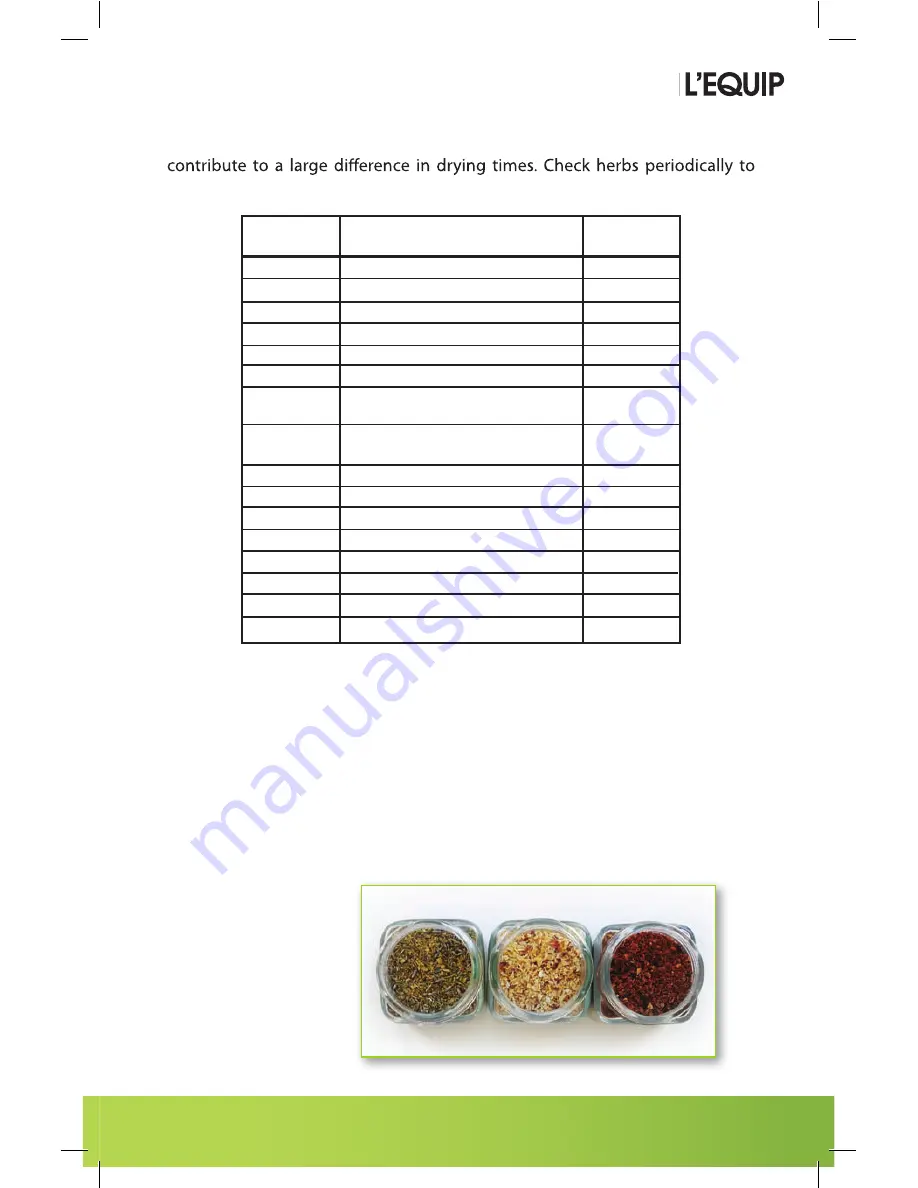
DEHYDRATOR
25
HERBS
Dried herbs are much more flavorful than fresh herbs. 8 oz. fresh herbs = 1 oz.
dried herbs.
Many herbs can be harvested through the entire growing season. Two-thirds
of the plant may be cut, leaving the rest to grow. Once plants are cut, regular
cuttings will prevent them from flowering.
Flowers, seeds, leaves and steams can all be used for seasoning. If flowers are
used in teas, dry them whole. Remove any tough or discolored parts.
Dried herbs have an excellent shelf life. If stored under normal storage condi-
tions, they will keep their potency for four years or more. Dark colored contain-
ers are best for storage. Light fades color and weakens flavors.
Preparation:
• Select herbs just before the plant blooms. Leaves should be fully developed,
yet tender.
• Flowers should be harvested when they first open and are still very fresh.
• Harvest on a sunny morning after the dew has evaporated.
• Herbs require no pretreatment.
• Wash leaves and stems lightly in cold water. Spread on absorbent towel or
shake off any visible moisture.
• Be sure to remove any brown spots and insect debris from the leaves.
• Strip leaves from larger stems. Parsley and sage may be dried on the stems.
Entire pods or seeds of chili peppers can be dried.
• Herbs can be placed on the drying trays within minutes of picking and
cleaning.
• Use either mesh insert trays or fruit leather sheets.
• Herbs will be brittle and crumble easily when dried. Some leaves will darken
in color but that does not affect flavor.
• After drying leaves, they can be left whole, stripped from the stem, or
crushed. To crush rub between fingers, use mortar and pestle or press
through a fine screen.
• Store in airtight containers in a cool, dark, dry place. If moisture appears on
the inside of the container, the herbs will need further drying.
• Dried herbs can be difficult to distinguish from one another, so storage
containers should be labeled immediately following drying.
Suggested uses for dehydrated herbs:
Use in Italian, Mexican and Chinese dishes. Also use in soups, stews, sauces,
vegetables, salads, cakes, cookies, meat dishes, fish dishes, egg dishes and in
seasoning mixes.
NOTE: Use average times only as a general guideline. Many variables can
ensure correct drying results.
Herb Butter:
½ cup butter or margarine, softened
1 Tbsp lemon juice
1 Tbsp crushed dried herbs*
Salt and Pepper
*Suggested herbs include dill, oregano, basil and tarragon.
In small bowl cream butter or margarine. Slowly add lemon juice. Add herbs,
and salt and pepper to taste. Cover and refrigerate.
Herb
Part of plant to dehydrate
Avg. Dry
Time (Hrs)
Basil
Leaves
1-3
Chili Peppers Pods
5-12
Chives
Leaves (Chop)
2-3
Cilantro
Leaves
1-3
Cumin
Seeds
2-5
Dill
Leaves
1-3
Fennel
Leaves and seeds
1-3 leaves
2-5 seeds
Garlic
Cloves (Break bulbs into cloves.
3-5
Remove outer peel of each clove)
Ginger
Root and leaves
1-3
Mint
Leaves
1-3
Oregano
Leaves
1-3
Parsley
Leaves and stems
1-3
Rosemary
Leaves
1-3
Sage
Leaves and stems
1-3
Tarragon
Leaves
1-3
Thyme
Leaves
1-3
















































